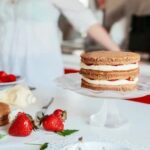Are you passionate about baking and creating beautiful, customized cakes? If so, you may be considering a career as a professional baker cake decorator.
In this article, we will explore the essential steps to becoming a successful professional in this creative and fulfilling field. From education and training to mastering cake decorating techniques, developing a signature style, building a portfolio, networking in the industry, marketing yourself, and managing the business side of baking and cake decorating, we will cover everything you need to know to kickstart your career.
Becoming a professional baker cake decorator requires more than just a love for baking – it involves obtaining the necessary culinary and baking skills through education and training. Additionally, gaining experience through apprenticeships, internships, and on-the-job training plays a crucial role in honing your craft. Mastering cake decorating techniques such as icing, fondant, and sugarcraft is also vital for creating visually stunning and delectable works of art.
Finding your unique creative expression in cake design is another important aspect of the profession. Building a portfolio that showcases your best work is essential for attracting clients. Lastly, networking with suppliers, bakers, event planners and effectively marketing yourself are key components of establishing yourself within the industry. Join us as we delve into these topics further and guide you on your journey to becoming a professional baker cake decorator.
Education and Training
Becoming a professional baker cake decorator requires a solid foundation in culinary and baking skills. While formal education is not always mandatory, obtaining training from a reputable culinary school or baking program can provide essential knowledge and techniques. Consider enrolling in courses that focus specifically on pastry arts, cake decorating, and confectionery skills. These programs often cover a wide range of topics such as ingredient selection, baking methods, flavor profiles, and decorative techniques.
In addition to formal education, gaining practical experience through hands-on training is invaluable. Seek out opportunities to work in commercial kitchens, bakeries, or catering companies where you can learn under the guidance of experienced professionals. This real-world experience will help you develop the speed, precision, and problem-solving abilities necessary for a career in professional baking and cake decorating.
Furthermore, don’t underestimate the value of workshops, seminars, and continuing education classes offered by industry experts. These events can provide valuable insights into emerging trends, innovative techniques, and advanced skills that will set you apart as a professional in the field of cake decoration. Taking advantage of these learning opportunities shows dedication to your craft and a commitment to continuous improvement.
- Enroll in pastry arts or cake decorating programs
- Seek hands-on training in commercial kitchens or bakeries
- Participate in workshops, seminars, and continuing education classes
Obtaining the necessary culinary and baking skills is an ongoing process that requires dedication to learning and honing your craft. By investing in education and training opportunities, you can build a strong foundation for success as a professional baker cake decorator while staying up-to-date with industry trends and techniques.
- Establishing a strong foundation with formal education
- Gaining practical experience through hands-on training
- Continuously learning through workshops and seminars
Gaining Experience
After obtaining the necessary culinary and baking skills through education and training, gaining practical experience is crucial for those aspiring to become professional bakers and cake decorators. Apprenticeships, internships, and on-the-job training provide valuable opportunities to apply learned techniques in real-life settings, learn from experienced professionals, and hone one’s craft.
Apprenticeships typically involve working under the supervision of a seasoned baker or cake decorator for a specified period. This hands-on approach allows individuals to observe and assist with the entire baking and decorating process, from ingredient preparation to presentation. Similarly, internships in commercial bakeries, pastry shops, or catering companies offer invaluable exposure to the fast-paced environment of professional baking and cake decorating.
On-the-job training may also be available at establishments that prioritize skill development. This can include entry-level positions at bakeries or confectionery shops where newcomers are taught essential techniques while contributing to daily operations. The guidance received during these formative experiences is instrumental in shaping the expertise of future professionals in the field.
Accordingly, it is important for aspiring bakers and cake decorators to seek out these opportunities to supplement their theoretical knowledge with practical know-how. By immersing oneself in an actual professional setting, individuals can understand how kitchens operate, observe industry best practices up close, and begin building a solid foundation for their careers. Networking with established professionals during these experiences can also open doors for future employment or collaboration.
| Gaining Experience | Importance |
|---|---|
| Apprenticeships | Provides hands-on experience under supervision |
| Internships | Exposure to professional baking environments |
| On-the-job training | Opportunities to learn essential techniques while working |
Mastering Cake Decorating Techniques
When it comes to becoming a professional baker and cake decorator, mastering cake decorating techniques is essential. This involves learning the art of icing, fondant, and sugarcraft. Icing is one of the fundamental skills that a cake decorator must possess. It involves the application of a smooth and even layer of icing on cakes to create a flawless finish. Different types of icing, such as buttercream and royal icing, require specific techniques for achieving different textures and designs.
Fondant is another crucial skill for cake decorators. It is a versatile type of icing that can be rolled out to cover an entire cake or used to create intricate decorations such as flowers, ribbons, and figurines. Learning how to work with fondant requires practice and patience, as it can be quite challenging to achieve a perfectly smooth finish without any cracks or wrinkles.
Sugarcraft involves molding and shaping edible materials like gum paste or modeling chocolate into various decorative elements for cakes. This can include crafting realistic flowers, delicate lace patterns, or intricate figurines that add an artistic touch to the finished product. Mastering sugarcraft requires creativity and precision in sculpting these elements by hand.
| Cake Decorating Techniques | Description |
|---|---|
| Icing | Application of smooth and even layer of icing on cakes |
| Fondant | Versatile type of icing for covering cakes and creating decorations |
| Sugarcraft | Molding edible materials into decorative elements for cakes |
Developing a Signature Style
Exploring Different Techniques and Mediums
As a professional baker cake decorator, it is essential to develop your own unique style in cake design. One way to do this is by exploring different techniques and mediums for decorating cakes. Experiment with various types of icing, fondant, sugarcraft, edible paints, and other decorative elements to find what resonates with your creative vision. Consider taking specialized courses or workshops to broaden your skills and understanding of different cake decorating methods.
Seeking Inspiration From Various Sources
To develop a signature style, it’s important to seek inspiration from various sources. Explore art, fashion, nature, architecture, and other creative disciplines to spark new ideas for cake designs. Pay attention to current trends in the baking industry while also drawing inspiration from timeless artistic movements. By immersing yourself in diverse sources of inspiration, you can cultivate a unique creative expression that sets your cake designs apart.
Embracing Personal Values and Aesthetics
Another crucial aspect of developing a signature style as a professional baker cake decorator is embracing your personal values and aesthetics. Consider what messages or emotions you want to convey through your cake designs. Whether it’s elegance, whimsy, sophistication, or playfulness, infuse your cakes with elements that speak to your individual aesthetic sensibilities. By staying true to your artistic vision and principles, you can carve out a distinct niche in the competitive world of cake decorating.
Building a Portfolio
Quality Photography
One of the most important aspects of building a portfolio is to invest in quality photography. Your cakes may be beautiful in real life, but if they are not captured well in photos, it will be difficult to attract potential clients. Consider hiring a professional photographer to take high-quality images of your cakes from different angles and under different lighting conditions.
Diversity of Designs
When creating your portfolio, it’s important to include a diverse range of designs and styles. This will show potential clients that you are capable of catering to their specific needs and preferences. Include examples of different types of cakes such as wedding cakes, birthday cakes, themed cakes, and specialty dessert items.
Client Testimonials
In addition to showcasing your best work through photos, including client testimonials can provide social proof of your skills and professionalism. Ask satisfied clients for their feedback and permission to use their testimonials in your portfolio. Positive reviews can go a long way in convincing potential clients of your abilities as a professional baker cake decorator.
Networking in the Baking Industry
Networking is an essential aspect of becoming a professional baker cake decorator. Connecting with suppliers, bakers, and event planners can open up various opportunities for career growth and business expansion. Building a strong network within the industry can lead to collaborations, referrals, and valuable insights into the latest trends and demands in the market.
One way to network effectively is by attending culinary and baking events, such as trade shows, workshops, and conferences. These gatherings provide a platform to meet potential suppliers for ingredients and equipment, interact with fellow bakers to exchange ideas and techniques, and establish relationships with event planners who may require your services for their upcoming functions.
Moreover, joining professional associations or organizations related to baking and cake decorating can also enhance networking opportunities. These groups often organize networking events, educational seminars, and industry competitions that allow members to connect with key players in the industry. Additionally, online networking through social media platforms like Instagram and LinkedIn can help you reach out to a wider audience and stay updated on industry news and developments.
Ultimately, effective networking in the baking industry can lead to beneficial collaborations that can elevate your skills as a professional baker cake decorator while also expanding your client base. By establishing meaningful connections with suppliers, bakers, and event planners, you can position yourself for long-term success in the competitive world of professional baking and cake decorating.
Marketing Yourself
As a professional baker and cake decorator, marketing yourself is essential for establishing a successful career in the industry. Creating a strong brand identity is the first step towards building a reputation and attracting clients. This involves designing a unique logo, choosing a cohesive color scheme, and creating a memorable business name that reflects your style and expertise. By developing a distinct brand image, you can differentiate yourself from competitors and leave a lasting impression on potential customers.
In today’s digital age, having a professional website is crucial for reaching a wider audience and showcasing your portfolio of work. Your website should feature high-quality photos of your cakes and baked goods, along with detailed information about your services, pricing, and contact details.
Additionally, consider including client testimonials or reviews to build trust with prospective clients. A well-designed website not only acts as an online storefront but also serves as a powerful marketing tool to attract potential customers.
Using social media platforms such as Instagram, Facebook, and Pinterest can significantly boost your visibility as a professional baker and cake decorator. These platforms allow you to share visually appealing content, engage with followers, and showcase your latest creations in real-time. By consistently posting high-quality photos of your work, sharing behind-the-scenes glimpses of your creative process, and interacting with followers through comments and messages, you can cultivate a dedicated following and attract new clients.
Overall, marketing yourself effectively involves creating a cohesive brand image, developing an impressive online presence through a professional website and social media platforms, and engaging with potential clients to showcase your skills as a professional baker cake decorator. Building brand awareness through strategic marketing efforts is key to establishing yourself in the competitive baking industry. With dedication and creativity, you can successfully promote your services to attract customers who appreciate your unique talents in cake decorating.
The Business Side
In conclusion, becoming a professional baker and cake decorator requires dedication, hard work, and a passion for the art of baking and design. It starts with obtaining the necessary education and training in culinary arts and baking, as well as gaining practical experience through apprenticeships, internships, and on-the-job training. Mastering cake decorating techniques such as icing, fondant, and sugarcraft is essential to creating beautiful and delicious cakes.
Furthermore, finding your unique creative expression in cake design is crucial in developing a signature style that sets you apart from others in the industry. Building a portfolio to showcase your best work is an effective way to attract clients, while networking with suppliers, bakers, and event planners can open doors to new opportunities. Additionally, marketing yourself through establishing a brand, creating a website, and using social media can help promote your services to potential customers.
It’s also important to understand the business side of professional baking and cake decorating by managing finances, pricing your products/services effectively, and being aware of the legal aspects of running a baking business. By following these steps and continuously honing your skills, you can ultimately achieve success as a professional baker cake decorator.
Frequently Asked Questions
How Long Does It Take to Become a Professional Cake Decorator?
The time it takes to become a professional cake decorator can vary depending on the individual’s dedication and the specific skills they want to acquire. Some may complete formal training in a matter of months, while others may take years to develop their craft.
What Qualifications Do You Need to Be a Cake Decorator?
To be a cake decorator, formal qualifications are not always necessary, but they can certainly help. Many professionals in this field have completed vocational programs or obtained a degree in culinary arts or hospitality. However, what often matters most is a demonstrable skill set and creativity.
How Do I Become a Professional Cake Baker?
Becoming a professional cake baker typically involves some form of formal training, such as completing a pastry arts program at a culinary school or gaining experience through an apprenticeship. Aspiring bakers should also work on developing their baking skills by practicing and experimenting with different recipes and techniques.

Welcome to my blog about home and family. This blog is a place where I will share my thoughts, ideas, and experiences related to these important topics. I am a stay-at-home mom with two young children. I hope you enjoy reading it! and may find some helpful tips and ideas that will make your home and family life even better!





